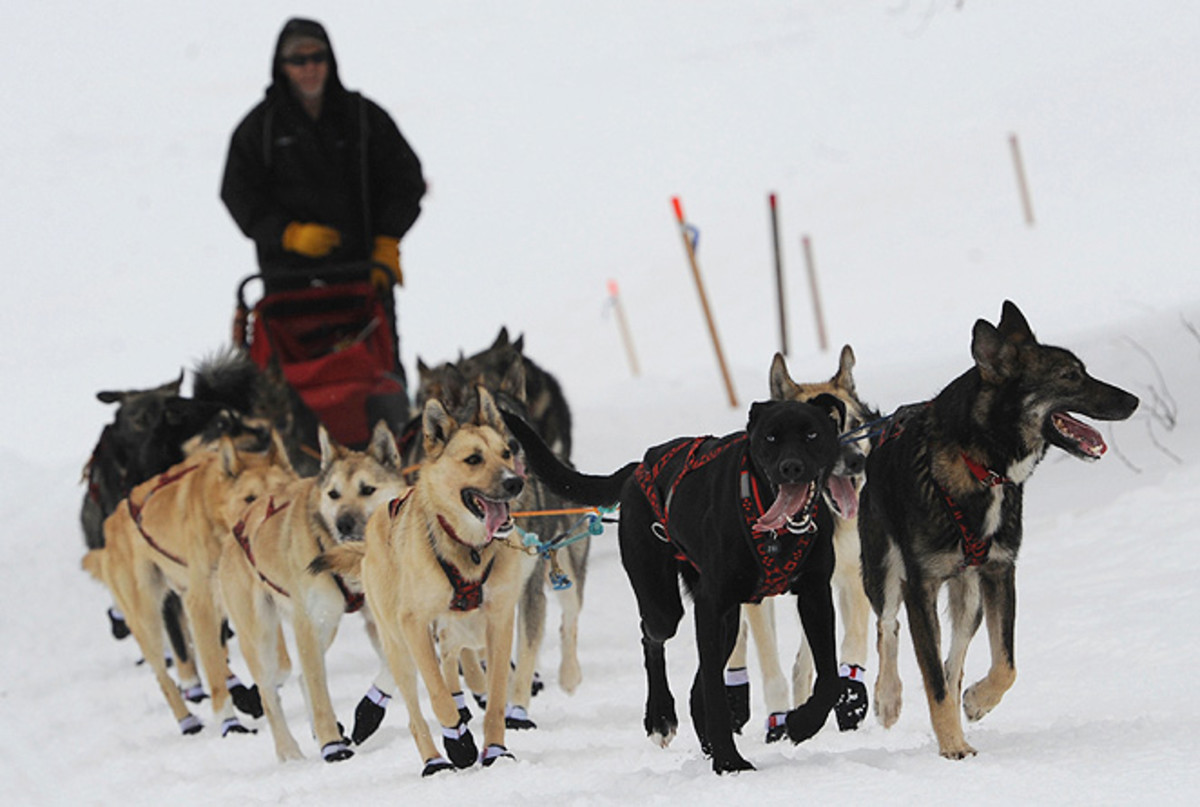Former champion Mitch Seavey reclaims lead in Iditarod

Jeff King (top) held the lead Monday but was last tracked six miles behind 2004 Iditarod winner Mitch Seavey.
Bill Roth/ZumaPress.com
NOME, Alaska (AP) -- Alaska's famous 1,000-mile Iditarod Trail Sled Dog Race has come down to a furiously contested sprint among veterans, with one seasoned musher grabbing the lead from another Monday and several others within striking distance.
By evening, 2004 Iditarod winner Mitch Seavey was ahead of four-time champion Jeff King and last year's runner-up Aliy Zirkle, as he reached the checkpoint at Elim, 123 miles from the finish line in Nome, a frontier town on Alaska's wind-pummeled coast.
Others were closing in, including Ray Redington Jr., the grandson of race co-founder Joe Redington Sr. Nome favorite Aaron Burmeister was fifth behind Redington as he raced toward his hometown.
If he were to win the Iditarod, one local official said, it could be pandemonium. The "place would come unglued," said Richard Beneville, the vice president of the Nome Chamber of Commerce.
Even though Seavey's son, Dallas Seavey, won after beating Zirkle by an hour last year, leaders in this year's Iditarod have been leapfrogging each other. That led race spokeswoman Erin McLarnon to call this year's race of the tightest in years.
Front-runners began traveling north along the frozen Bering Sea Coast on Sunday as they jockeyed for the front of the line.
King snatched the lead earlier Monday from Seavey, leaving the Koyuk checkpoint first.
King left Koyuk just six minutes after arriving, then camped out for a while 8 miles from the checkpoint. His team began moving again late morning.
"You must be having fun," a local said in an Iditarod.com video as the 57-year-old veteran prepared to leave Koyuk.
"Does it show?" King said.
Seavey fed his team as King headed out.
Seavey had been leading since Sunday and beat King to Koyuk by 34 minutes. The 53-year-old musher rested his team then left three hours and two minutes after King.
"Only one thing to do," Seavey said in an Iditarod.com video. "I can't make speed without resting."
The race began March 2 with 66 teams at a ceremonial start in Anchorage. The competitive start began the following day in Willow and has since changed leaders several times. Those at the front of the field included four-time champions Lance Mackey and Martin Buser, who were running in 16th and 17th place, respectively, on Monday.
Mushers have taken mandatory 24-hour and 8-hour layovers. They also must take a second eight-hour layover at the checkpoint at White Mountain, 77 miles from Nome.
Five mushers have scratched. A sixth, Canadian Gerry Willomitzer, was withdrawn Sunday after losing a dog that was later found.
The first musher to reach Nome will win $50,400 and a new 2013 Dodge Ram pickup truck. The rest of the $600,000 purse will be split among the next 29 mushers to cross the finish line.
As teams push toward Nome, the town of 3,700 was bustling with anticipation.
Volunteers in the old gold rush town erected the famed burled arch on Front Street, a block off the sea, on Sunday. Monday morning, volunteers put up the finish banner that hangs above the arch.
Inside the city's small convention center, which doubles as race headquarters, banners with each musher's name were being hung from the rafters by volunteers working with Alaska Missions including Shannon Scoggins, 22, of Stephenville, Texas.
Her group will spend the rest of the week caring for the canine participants at dog lots on the outskirts of town.
"It'll be a once-in-a-lifetime chance," she said. "We're excited about that."
In Nome, McLarnon said the race was shaping up to have an exciting finish with so many front-runners clustered together.
But will it match the 1978 mad dash down Front Street that left Dick Mackey as the winner with one second to spare over Rick Swenson, who went on to become the Iditarod's only five-time champion?
"You know, it very well could be" McLarnon said. "The way the things are looking right now, it could be one of those close ones."
Race watchers are predicting a Tuesday afternoon finish in Nome, but off any record-setting pace. McLarnon said it usually takes mushers about 18 hours to reach Front Street after they hit White Mountain, a checkpoint 77 miles from the finish and where they have to take a mandatory eight-hour layover.
"In that last 77 miles, anything can happen," McLarnon said.





